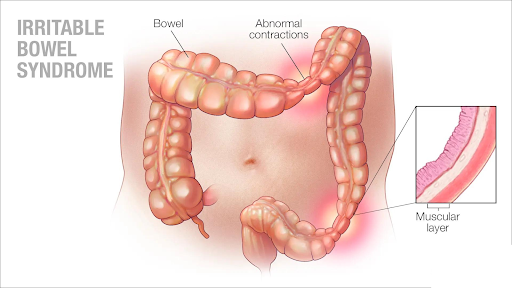It is a common gastrointestinal disorder seen by doctors. Given the symptoms that the disease causes, it’s no surprise that patients with IBS can experience a significant impact on their quality of life. Common symptoms include bloating, stomach pain, diarrhoea, constipation, distention, incontinence, and food intolerance.
The disease typically presents in one of three subtypes:
- IBS with predominant constipation (IBS-C)
- IBS with diarrhoea (IBS-D)
- IBS with alternating constipation and diarrhoea (IBS-M)
If you have IBS-D, what triggers your symptoms might not be the same as someone with IBS-C. For those with mixed-type IBS, triggers could be a combination of factors. Individuals might transition between different IBS types over time, such as from IBS-C or IBS-D to IBS-M. Even within the same subtype, identifying and avoiding specific foods that trigger symptoms varies for each person.
Low-FODMAP Diet for IBS
Elimination– Foods high in FODMAPs are removed from your diet for two to six weeks.
Reintroduction– FODMAPs are reintroduced into the diet. One food at a time to discover which ones cause issues.
Personalization– Finally, you modify your diet to include a wider variety of foods. Adjust the type and amount of FODMAP carbs based on what you learned during the reintroduction phase.
Foods to avoid
- Lactose (a sugar naturally present in milk and other dairy foods)
- Certain fruits like peaches, watermelon, pears, mango, etc
- High-fructose corn syrup
- Legumes and beans
- Artificial sweeteners
- Cereals, Pasta and Wheat-based bread
- Certain vegetables like artichokes, broccoli, onions, asparagus, brussels sprouts
Gluten-free diet
Gluten is a protein present in grain products, including bread and pasta. This protein can damage the intestines in those with gluten intolerance.
In cases where people have sensitivity or intolerance to gluten, they may experience IBS symptoms when consuming a gluten-containing diet. Such patients report an improvement in symptoms when they eliminate gluten from their diet.
A small study conducted in 2016 involving 41 people with IBS indicated that following a gluten-free diet for 6 weeks reduced symptoms. Those who continued to follow the diet for 18 months showed a further improvement in symptoms.
To test if eliminating barley, rye, and wheat helps, cut out foods like bread, cereal, crackers, pasta, certain sauces, malt vinegar, and beer.
General Dietary Recommendations For IBS
High-Fiber Foods
- Incorporate soluble fibre-rich foods into your diet, such as oats, fruits (e.g., berries, bananas), and vegetables (e.g., carrots, sweet potatoes). Soluble fibre can help regulate bowel movements and ease symptoms associated with both constipation and diarrhoea.
- While insoluble fibre may exacerbate symptoms for some, it can be beneficial for others. Experiment with sources like whole grains, nuts, and seeds, and monitor individual responses.
Low-Fiber Foods
- Opt for refined grains like white rice and white bread over their whole counterparts, as they are generally gentle on the digestive system.
- Cooking vegetables can break down their fibre content, making them easier to digest.
- Steamed or boiled vegetables may be better tolerated than raw ones.
Low-Fat Foods
- Choose healthy fat sources like avocados, olive oil, and fatty fish. These can provide essential nutrients without triggering symptoms associated with high-fat diets.
- Reduce intake of saturated fats found in fried foods and certain animal products, as they may contribute to inflammation and discomfort.
Foods for IBS-C (Constipation) and IBS-D (Diarrhoea)
IBS-C: Increase fluid intake and consume prunes, kiwi, and other fruits with natural laxative properties. Whole grains and legumes can also help in regular bowel movements.IBS-D: Opt for a low-FODMAP diet to alleviate symptoms. Incorporate easily digestible foods like bananas, rice, and plain crackers. Probiotic-rich foods, such as yoghurt, may also help restore gut balance.
Other Tips
- Eat mindfully: Maintain regular meal times and eat slowly to avoid digestive discomfort.
- Listen to your body: Stop eating when comfortably full to prevent symptom flare-ups.
- Stay hydrated: Aim for at least 8 cups of fluids daily — water, herbal teas, and diluted juices work best.
- Limit irritants: Cut back on caffeine (max two cups/day), alcohol, and sugary or carbonated drinks.
Need Help Managing Your IBS Symptoms?
Managing IBS can be overwhelming, especially when dietary changes alone don’t offer complete relief. That’s where expert guidance becomes essential. Dr. K.V. Dinesh Reddy, a leading gastroenterologist in Hyderabad, specializes in diagnosing and treating IBS with personalized, evidence-based plans tailored to your unique symptoms.
Take the first step toward better digestive health — book a consultation with Dr. K.V. Dinesh Reddy today and get expert care you can trust.


